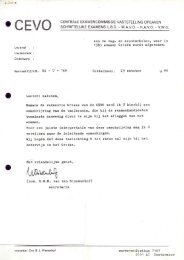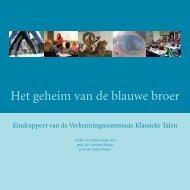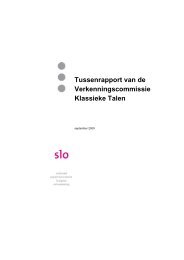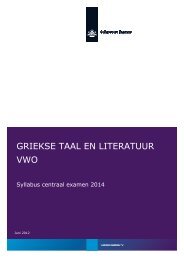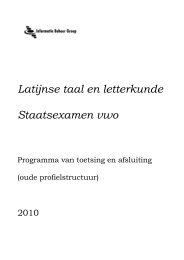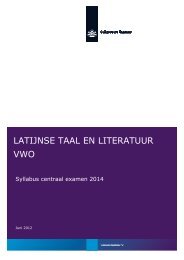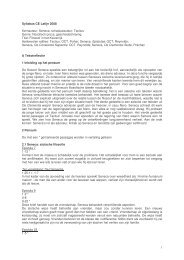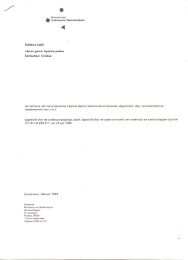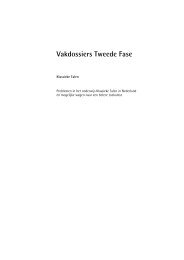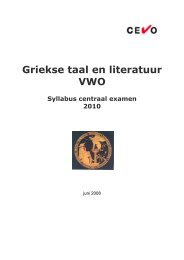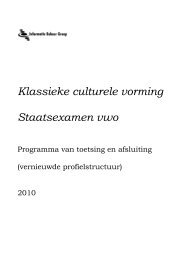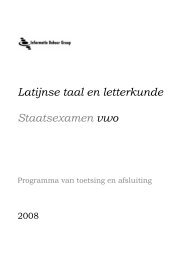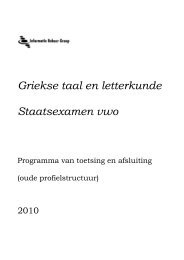Rome Wasn't Digitized in a Day - Council on Library and Information ...
Rome Wasn't Digitized in a Day - Council on Library and Information ...
Rome Wasn't Digitized in a Day - Council on Library and Information ...
Create successful ePaper yourself
Turn your PDF publications into a flip-book with our unique Google optimized e-Paper software.
231<br />
the digital arts <strong>and</strong> humanities are now fac<str<strong>on</strong>g>in</str<strong>on</strong>g>g what might be termed a complexity deluge. This<br />
can be def<str<strong>on</strong>g>in</str<strong>on</strong>g>ed as the presence of a range of opportunities aris<str<strong>on</strong>g>in</str<strong>on</strong>g>g from the rate of technological<br />
change <strong>and</strong> the availability of e-<str<strong>on</strong>g>in</str<strong>on</strong>g>frastructure, that the ma<str<strong>on</strong>g>in</str<strong>on</strong>g>stream academic community is not<br />
yet equipped to address its research questi<strong>on</strong>s with (Dunn 2009).<br />
Dunn worried that this lack of read<str<strong>on</strong>g>in</str<strong>on</strong>g>ess <strong>on</strong> the part of academia meant that technology, rather than<br />
“research questi<strong>on</strong>s,” would drive the development of <str<strong>on</strong>g>in</str<strong>on</strong>g>frastructure agendas.<br />
The complex nature of humanities data <strong>and</strong> the challenges of build<str<strong>on</strong>g>in</str<strong>on</strong>g>g a cyber<str<strong>on</strong>g>in</str<strong>on</strong>g>frastructure for these<br />
data have also been explored by Blanke et al. (2008, 2009), particularly <str<strong>on</strong>g>in</str<strong>on</strong>g> terms of the semantically<br />
<strong>and</strong> structurally diverse data sets that are <str<strong>on</strong>g>in</str<strong>on</strong>g>volved <strong>and</strong> the highly c<strong>on</strong>textual <strong>and</strong> qualitative nature of<br />
much of the data. “The <str<strong>on</strong>g>in</str<strong>on</strong>g>tegrati<strong>on</strong> of data items <str<strong>on</strong>g>in</str<strong>on</strong>g>to arts <strong>and</strong> humanities research is n<strong>on</strong>-trivial, as<br />
complicated semantics underlie the archives of human reports,” they expla<str<strong>on</strong>g>in</str<strong>on</strong>g>ed, not<str<strong>on</strong>g>in</str<strong>on</strong>g>g how<br />
“humanities data may be highly c<strong>on</strong>textual, its <str<strong>on</strong>g>in</str<strong>on</strong>g>terpretati<strong>on</strong> depend<str<strong>on</strong>g>in</str<strong>on</strong>g>g <strong>on</strong> relati<strong>on</strong>ships to other<br />
resources <strong>and</strong> collecti<strong>on</strong>s, which are not necessarily digital”(Blanke et al. 2009). This semantic,<br />
structural, <strong>and</strong> c<strong>on</strong>textual complexity led to a number of computati<strong>on</strong>al problems, <str<strong>on</strong>g>in</str<strong>on</strong>g>clud<str<strong>on</strong>g>in</str<strong>on</strong>g>g the lack of<br />
formats or <str<strong>on</strong>g>in</str<strong>on</strong>g>terfaces to make data/systems <str<strong>on</strong>g>in</str<strong>on</strong>g>teroperable (Blanke et al. 2008). The difficulty of<br />
design<str<strong>on</strong>g>in</str<strong>on</strong>g>g for the “fuzzy” <strong>and</strong> <str<strong>on</strong>g>in</str<strong>on</strong>g>c<strong>on</strong>sistent nature of data <str<strong>on</strong>g>in</str<strong>on</strong>g> the humanities was also acknowledged by<br />
OKell et al. (2010) <str<strong>on</strong>g>in</str<strong>on</strong>g> their overview of creat<str<strong>on</strong>g>in</str<strong>on</strong>g>g a reusable digital learn<str<strong>on</strong>g>in</str<strong>on</strong>g>g object, <strong>and</strong> they<br />
c<strong>on</strong>sequently labeled the humanities as an “ill structured knowledge doma<str<strong>on</strong>g>in</str<strong>on</strong>g>.”<br />
Similar challenges <str<strong>on</strong>g>in</str<strong>on</strong>g> humanities data <str<strong>on</strong>g>in</str<strong>on</strong>g>tegrati<strong>on</strong> were reported by the LaQuAT project when they<br />
evaluated the results of <str<strong>on</strong>g>in</str<strong>on</strong>g>tegrat<str<strong>on</strong>g>in</str<strong>on</strong>g>g Projet Volterra <strong>and</strong> the HGV (Jacks<strong>on</strong> et al. 2009), <strong>and</strong> they<br />
acknowledged that there were still many limits to the automatic <str<strong>on</strong>g>in</str<strong>on</strong>g>tegrati<strong>on</strong> of humanities data sets.<br />
They proposed build<str<strong>on</strong>g>in</str<strong>on</strong>g>g systems that made use of human annotati<strong>on</strong>s <str<strong>on</strong>g>in</str<strong>on</strong>g> help<str<strong>on</strong>g>in</str<strong>on</strong>g>g l<str<strong>on</strong>g>in</str<strong>on</strong>g>k diverse data sets<br />
<str<strong>on</strong>g>in</str<strong>on</strong>g> a mean<str<strong>on</strong>g>in</str<strong>on</strong>g>gful way:<br />
Our <str<strong>on</strong>g>in</str<strong>on</strong>g>vestigati<strong>on</strong>s led us to c<strong>on</strong>clude that there is a need am<strong>on</strong>g at least some humanities<br />
researchers for tools support<str<strong>on</strong>g>in</str<strong>on</strong>g>g collaborative processes that <str<strong>on</strong>g>in</str<strong>on</strong>g>volve access to <strong>and</strong> use of<br />
complex, diverse <strong>and</strong> geographically distributed data resources, <str<strong>on</strong>g>in</str<strong>on</strong>g>clud<str<strong>on</strong>g>in</str<strong>on</strong>g>g both automated<br />
process<str<strong>on</strong>g>in</str<strong>on</strong>g>g <strong>and</strong> human manipulati<strong>on</strong>, <str<strong>on</strong>g>in</str<strong>on</strong>g> envir<strong>on</strong>ments where research groups (<str<strong>on</strong>g>in</str<strong>on</strong>g> the form of<br />
"virtual organisati<strong>on</strong>s"), research data <strong>and</strong> research outputs may all cross <str<strong>on</strong>g>in</str<strong>on</strong>g>stituti<strong>on</strong>al<br />
boundaries <strong>and</strong> be subject to different, aut<strong>on</strong>omous management regimes (Hedges 2009).<br />
The need for <str<strong>on</strong>g>in</str<strong>on</strong>g>frastructural soluti<strong>on</strong>s that deal not just with the complexities of humanities data but<br />
also with the fact that such data are often geographically distributed <strong>and</strong> can bel<strong>on</strong>g to different<br />
organizati<strong>on</strong>s with different data-management practices is further explored <str<strong>on</strong>g>in</str<strong>on</strong>g> the next secti<strong>on</strong>.<br />
“General” Humanities Infrastructures, Doma<str<strong>on</strong>g>in</str<strong>on</strong>g>-Specific Needs, <strong>and</strong> the Needs of<br />
Humanists<br />
To return to the idea of general requirements for a humanities cyber<str<strong>on</strong>g>in</str<strong>on</strong>g>frastructure, the ACLS report<br />
c<strong>on</strong>cluded that at a bare m<str<strong>on</strong>g>in</str<strong>on</strong>g>imum such an <str<strong>on</strong>g>in</str<strong>on</strong>g>frastructure will have to be a public good, susta<str<strong>on</strong>g>in</str<strong>on</strong>g>able,<br />
collaborative, <str<strong>on</strong>g>in</str<strong>on</strong>g>teroperable, <strong>and</strong> support experimentati<strong>on</strong> (ACLS 2006). These ideas have been<br />
supported <str<strong>on</strong>g>in</str<strong>on</strong>g> a variety of other recent research <strong>on</strong> how to build a general humanities<br />
cyber<str<strong>on</strong>g>in</str<strong>on</strong>g>frastructure. Franciska de J<strong>on</strong>g, <str<strong>on</strong>g>in</str<strong>on</strong>g> a recent address to the European Chapter of the Associati<strong>on</strong><br />
for Computati<strong>on</strong>al L<str<strong>on</strong>g>in</str<strong>on</strong>g>guistics (EACL), del<str<strong>on</strong>g>in</str<strong>on</strong>g>eated similar requirements for an <str<strong>on</strong>g>in</str<strong>on</strong>g>frastructure that<br />
would support new “knowledge-driven workflows.” This list <str<strong>on</strong>g>in</str<strong>on</strong>g>cluded the “coord<str<strong>on</strong>g>in</str<strong>on</strong>g>ati<strong>on</strong> of coherent<br />
platforms (both local <strong>and</strong> <str<strong>on</strong>g>in</str<strong>on</strong>g>ternati<strong>on</strong>al)” to support the <str<strong>on</strong>g>in</str<strong>on</strong>g>teracti<strong>on</strong> of communities <strong>and</strong> the exchange of



